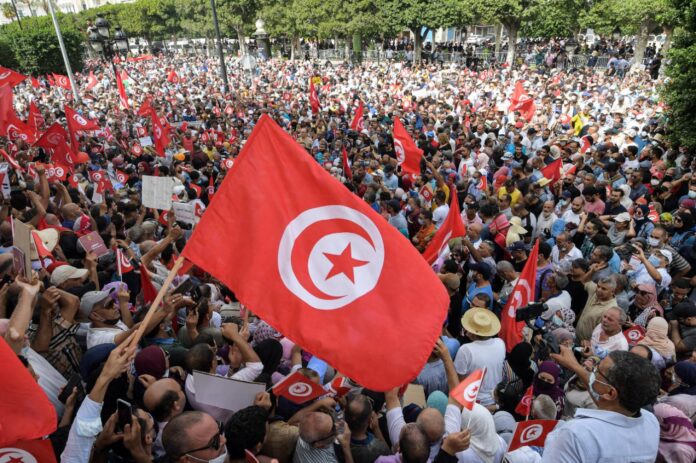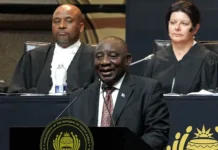Thousands of Tunisians have demonstrated against President Kais Saied as the country faces a deepening political and economic crisis.
A crowd gathered in the capital Tunis to demand the end of his government.
Tunisians who supported Mr. Saied since he came to power in 2021 have grown increasingly frustrated with the state of the economy.
The protests come 12 years to the day since former dictator Zine al-Abidine
Ben Ali was forced into exile.
Ennahdha had dominated parliament until Saied sacked the government and froze parliament before appointing a new cabinet and ruling by decree.
Another march, by the anti-Islamist opposition Free Destourian Party, took place near the presidential palace.
Many Tunisians are angry at the economic crisis which has left many supermarket shelves empty amid ongoing shortages of food items such as coffee, couscous and sugar.
Supermarkets are now rationing some produce such as pasta and milk to ensure stocks don’t diminish any further.
Officials say the rationing of some consumer products is a preventive measure but campaigners are demanding the state declares a state of water emergency.
Agriculture Ministry official, Hammadi Habib, earlier said: “If we do not take decisions in January to reduce irrigation water and ration water use now to prioritise drinking water then for sure in August we will not have drinking water in the capital or coastal regions.”
Tunisia’s food supply problems are, in part, due to high global prices and the government’s own financial difficulties, which have reduced its capacity to buy imported food and subsidize farms at home.
The government has so far unable to secure an international bailout leading one protester to tell the AFP news agency “the coup has brought us famine and poverty”.
In Tunis’ central Habib Bourguiba Avenue, a traditional site for demonstrations, Said Anouar Ali, 34, said: “Tunisia is going through the most dangerous time in its history.
“Saied took control of all authority and struck at democracy. The economy is collapsing. We will not be silent,” he added.
The protests in the capital were organised by two different opposition groups with a heavy police presence outside the Interior Ministry to prevent scuffles.
Separately, protesters also marched against Mr Saied’s seizure of near total power.
In 2021, the president sacked the prime minister, suspended parliament and pushed through a constitution enshrining his one-man rule.
The new constitution replaced one drafted soon after the Arab Spring in 2011, which saw Tunisia overthrow late dictator Zine al-Abidine Ben Ali. It gave the head of state full executive control and supreme command of the army.
Mr Saied has justified his actions by saying he needed new powers to break a cycle of political paralysis and economic decay.














